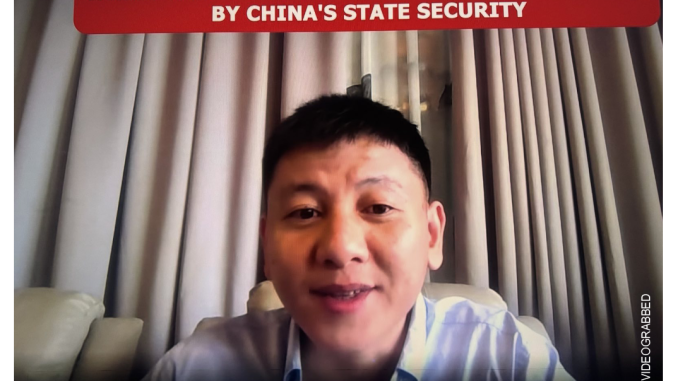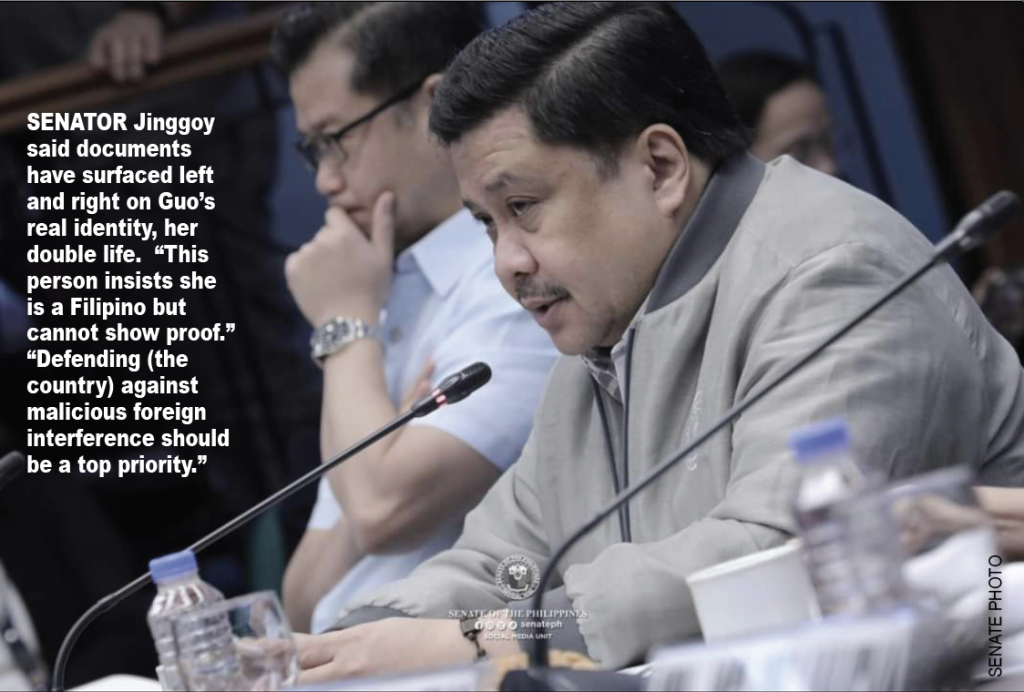
By TONY LOPEZ
Senate hearings on Philippine offshore gaming operations (POGOs) have shifted their focus from illegal gambling to something overarching and spine-chilling—spying. Specifically, spying by China.
One emerging narrative: Alice Leal Guo, alias Guo Hua Ping, is a spy, a very sophisticated, smooth, and suave spy.
Initially, Guo was linked to the massive multi-billion POGO operation, right behind the Bamban, Tarlac Municipal Hall where she held office as mayor since July 1, 2022. On June 3, 2024, the Ombudsman suspended Guo for six months as mayor, over graft.
In his July 22, 2024 State of the Nation Address, President Ferdinand R. Marcos Jr. denounced POGOs for having ventured “into illicit areas furthest from gaming, such as financial scamming, money laundering, prostitution, human trafficking, kidnapping, brutal torture—even murder”, all “grave abuses and disrespect to our system of laws.” The President ordered POGOs stopped, immediately.
Moving on, the Senate might want to venture another uncharted territory—cryptocurrency which is legal (but could be a vehicle for money laundering). Crypto speculation has up to nine million Filipino players, 4.5x the number of local stock market investors (two million) or POGO players (also two million).
On Tuesday, Oct. 8, 2024, Senate President Protempore Jinggoy Estrada, chair of the Senate Committee on National Defense and Security, was alarmed by the explosive revelation by Al Jazeera that Alice Guo is an agent or a spy of the China Ministry of State Security (MSS) based on allegations of China-born gambling tycoon Mr. She Zhijiang, now detained in Thailand. Mr. She had claimed Guo is his fellow agent at MSS, the Chinese intelligence and secret police agency.
Estrada urged our state intelligence and security agencies to take a closer look into this “serious national concern”, “verify whether or not covert and illegal operations are being undertaken here as part of a foreign country’s global influence operation.” “We must identify all those who exploited the vulnerabilities in our system either for personal gain or for the benefit of a foreign entity and make them accountable,” he said.
Senator Jinggoy said documents have surfaced left and right on Guo’s real identity, her double life. “This person insists she is a Filipino but cannot show proof.” “Defending (the country) against malicious foreign interference should be a top priority.”
Estrada has filed Senate Bill 2368 amending the Espionage Law (Commonwealth Act 616) of 1941 which covers only espionage when the Philippines or the US is at war and does not cover current and future technology or even running for a public despite one being an alien spy.
At Tuesday’s eight-hour hearing, chair Sen. Riza Hontiveros featured a video interview with a certain Wang Fu Gui, a prison cellmate for 15 years, a good friend, and trustee for the confidential files of Mr. She Zhijiang. Wang uncovered Guo’s secret files. “Ms. Guo was a spy, but not a special one,” Wang said.

In prison, Mr. She told Wang about She’s and Guo’s similar circumstances as spies. In the video, Wang narrated:
“All field agents recruited by state security have very detailed background information investigated. Special hacking teams and hometown associations and chambers of commerce collect background information on MSS agents.
Field agents controlled
“This is the main method of controlling the field agents overseas by state security. For example, Guo Hua Ping’s fake Filipino identity is such a secret and weakness that she can only listen to state security. Mr. She’s experience is similar.
“The overseas special agents recruited by China’s state security include spies who collect intelligence, and many others work for the political and economic interests of the Chinese government such as officials and businessmen in some countries. The Chinese government has a very big appetite (for intelligence and information).”
Mr. She, Wang insisted, “is telling the truth (about Guo),” adding, “if you read the documents, you will too.” Wang said the MSS arranged Alice Guo’s election as Bamban mayor.
Asked if there are other Chinese spies in the Philippines, Wang replied, “there are people from all other countries and they are not all Chinese.”
Filipinos are spies?
Meaning, could some Chinese spies here be Filipinos?
Wang thinks Guo and Mr. She share a common handler, a certain Ma Dongli, a member of the Chinese Communist Politburo, a second generation Reds, has an American identity, also the vice president of the Thai Chinese Association, and the third highest ranking member of the Yatai, a Myanmar real estate conglomerate.
According to European press reports, Chinese spying lately has focused on three priorities: “to shape political and economic trends in line with China’s interests; gather information on sensitive industries; and to monitor the diaspora populations, particularly minority groups such as Tibetans, Uyghurs and Hongkongers.”
In the past decade, China became an unrivalled economic power, with GDP, in purchasing power parity (PPP) value of $36.29 trillion, vs. the US’s $28.78 trillion.
With that rise, China has deployed spies all over the world (Europe, the US, Asia and Australia) for a number of reasons:
1) to gather information and intelligence;
2) expand influence and control in susceptible countries;
3) monitor the military activities of its enemies—and friends;
4) promote business and investments and acquire the latest in technology; and
5) promote strategic objectives.
Espionage consists of human intelligence and technical and cyber intelligence such as hacking. Chinese espionage today is said to be the largest in the world, beating the previous No. 1, Russia.
Of recent incidents of Chinese espionage, says the US Center for Strategic and International Studies, 49% directly involved Chinese military or government employees; 41% private Chinese citizens; and 10% non-Chinese actors.
On May 10, 2023, the Bangkok Post reported, She Zhijiang became a Cambodian citizen in 2017, is no longer a Chinese national, and had been doing business in Southeast Asian countries.
